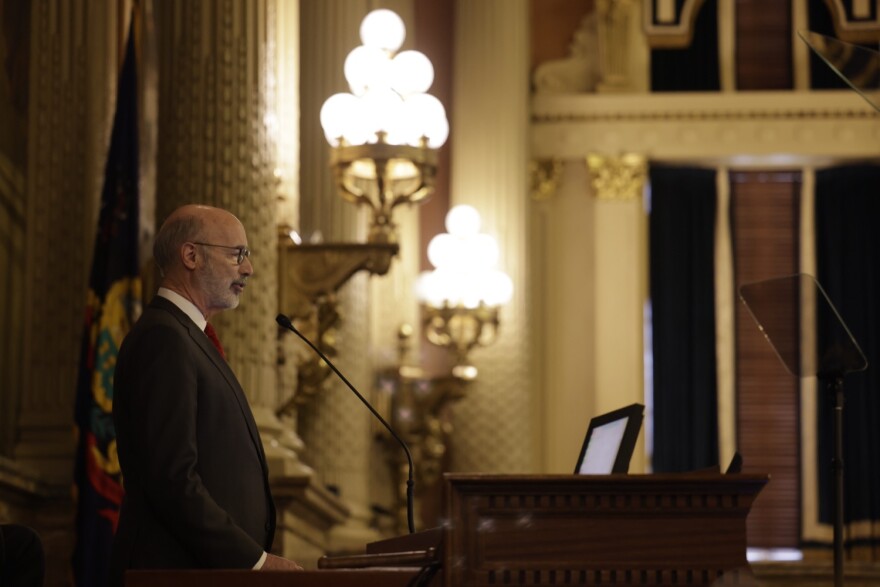HARRISBURG, Pa. - Gov. Tom Wolf delivered his eighth and final budget proposal Tuesday to a joint session of the House and Senate.
His plan would push state spending to $43.7 billion, asking lawmakers for the biggest-ever increase in aid for public schools, plus more money for direct care workers, higher-education institutions and college scholarships.
Wolf, a Democrat, took credit for leading the budget deficit he dealt with seven years ago into a surplus. He did, however, acknowledge that federal pandemic subsidies juiced the economy into a multibillion-dollar surplus.
“We are no longer digging out of a hole. We’re ready to build,” he said. “And this year’s budget does exactly that, making new investments that will build a brighter future for Pennsylvania families.”
Wolf went on to ask legislators to keep the promise of fair funding for schools, not only certain zip codes.
“Refusing to fund education equitably does not save us money. It just means we wind up spending more on social services, remedial programs, even prisons,” Wolf said, “And that calculation doesn’t even take into account the opportunity costs of failing to invest in our kids: the skills our workforce doesn’t develop, the products and services that never become reality, the business growth and tax revenues that vanish.”
Republican lawmakers assailed the plan. Republican Senate leaders said the proposal’s increased spending would come at the expense of the state’s long-term financial security.
Money pegged by Wolf for one-time expenses could be better spent preventing massive tax increases over the next several years, they said.
State Sen. Pat Browne, R-Lehigh and chairman of the Senate Appropriations Committee, said the timing is not good because of an unclear long-term financial picture.
“The governor’s revenue and spending projections over the next several years are unrealistic, do not align with traditional rates of growth and will make worse our existing structural imbalance,” Browne said in a prepared statement.
State Rep. Mike Schlossberg, D-Lehigh, applauded Wolf’s proposal, specifically the increases of basic education funding by $1.25 billion, special education funding by $200 million and Level Up funding by $300 million.
Schlossberg said the Parkland School District’s basic education subsidy would increase by $4.1 million, a 43 percent increase. The Allentown School District’s basic education increase would be $66.5 million – nearly 50 percent, according to Schlossberg.
Wolf also called for action on raising the minimum wage.
“...Our failure to increase the minimum wage is costing us dearly,” he said. “It’s very simple. When people are able to earn a decent wage, they can contribute to the economic life of their communities – and the commonwealth. On the other hand, when they work full time but still don’t earn enough to pay for bare necessities like food, shelter, clothing, and heat, taxpayers wind up footing the bill.”
Given the state’s big cash cushion, Wolf is proposing no change to state income or sales taxes.
Wolf acknowledged that members of the House and Senate will argue over elements of the budget; he called partisanship “part of our jobs.”
“By all means, let’s argue over it,” he said. “But in the end, let’s roll out an on-time budget that continues on the path we’ve traveled for the last seven years. “Let’s agree on a budget that continues to make Pennsylvania better for the people who live and work here. Let’s remind the world that a democracy can, in fact, deliver.”
The Associated Press contributed to this report.
Sign up for our WLVR weekly newsletter to stay up to date with the latest news from the Lehigh Valley and across Pennsylvania.


